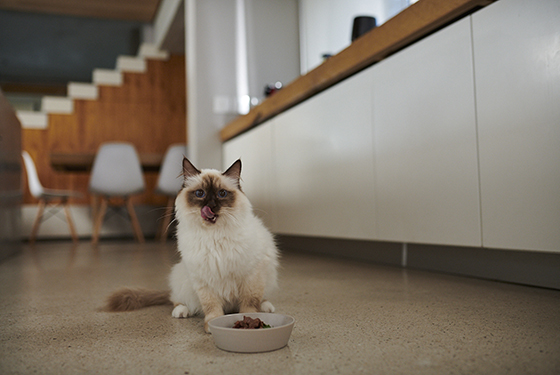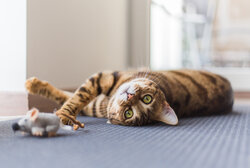Leaving your cat on its own
Most cats can easily be left alone for a few hours. However, when it comes to regular and/or longer absences or weekends away, there are various things you should bear in mind. We will explain what to consider in order to make it easier for your cat when it is left on its own.
Leaving kittens on their own – is this an option?
For the first ten to twelve weeks of their lives, kittens are surrounded by their mother and siblings all around the clock. But for most of them, the day will come when they move into a new home. This is a major change and challenge for the young cats. Although some of them may still be quite shy at first, they will all be looking for affection and someone they can trust. However, this will not happen overnight; the feeling of trust has to develop gradually. In the first weeks it is therefore important to take enough time for the kittens and, if possible, to avoid leaving them alone.
Ideally, you should take a week or two off work, unless you have other members of the family at home. It takes time for kittens to get over being separated from their family and to get used to their new owners. You should use this phase to spend a lot of time cuddling with your new pets and to ensure that they are subject to as little stress as possible. A kitten can become distressed if, for example, it wakes up and finds itself completely alone its new home. It is better to wait a few weeks until the new addition to your family has settled in and developed a certain routine in its day-to-day life.
How long does it take before you can leave your cat alone?
Cats all have very different characters: some are timid and reserved while others are more outgoing and fearless. This can determine how easy it is for them to be left alone. However, it does not automatically mean that things will be easier for a confident cat. In fact, it may become frustrated much more quickly when it is bored, whereas a more withdrawn or timid cat will often be happy to be left alone for a while. Whatever the case, it is important to minimise the amount of time a cat spends on its own in the first few weeks. This especially applies to kittens or if there are no other cats in the household.
Many things play a role in how long it will it be before you can leave a cat on its own. In addition to age and character, the breed can also be decisive. For example, Siamese cats, Maine Coons and Sacred Burmese are known for being very affectionate, which means that they may find it more difficult to be left alone than a common domestic shorthair, a Norwegian Forest Cat or a Russian Blue. However, exceptions are the rule here, so it is important to consider each cat individually.
How long can cats be left alone?
If you are forced to leave your cat alone regularly (for example, for work reasons), you should start training it in good time. It is hard for a cat to be looked after all around the clock and then suddenly to be left alone for several hours. It is better to gradually but continuously increase the amount of time your pet is left on its own. This will take some time and require plenty of effort, but it is an investment that will pay off throughout your cat’s life. It is a great feeling to know that your pet does not have a problem being left alone at home. The situation is very different if you are in constant fear that your cat is unhappy and may start wrecking your home or marking everything.
Ideally, leaving a cat alone should be practised and the periods gradually extended in small steps. It is no different with dogs, although as typical pack animals they usually find being alone more difficult. Cats usually sleep longer during the day and are less clingy than dogs. It is, however, an advantage if they are able to slowly get used to being left on their own. Start with just a few minutes and slowly but steadily increase the length of time that you are away. Each time you leave, avoid any dramatic farewell, and equally, when you return, do not overdo it when you greet your pet again. It is important to not make a fuss. If possible, look discreetly through the window from the outside, listen at the front door, or ask your neighbours if they have heard anything while you were away. If everything seems to be going well, you can extend the phases to several hours over the course of a few weeks.
Tips for when you leave your cat alone
A lot depends on the individual character of the cat, but there are also some ways to make it easier for them to spend time on their own. One very efficient solution is to get a second cat. Together they will very rarely get bored. If you are planning to have a cat and you know that you will often be forced to leave it alone, it is best to get two right from the start. Together they will be able to enjoy cuddling, playing and chasing each other around your home.
Another way to ensure that your pet has social contact with other cats is to let it go outdoors. With the help of a cat flap, your pet will be able to go outside whenever it likes. It is, however, important to consider the traffic. Sadly, many cats are killed on roads every year. Cats that are allowed outside also become ill more often, which is why their life expectancy is lower than that of an indoor cat. A garden with a cat-proof fence or an outdoor enclosure is therefore ideal. If, however, your living situation makes outdoor access impossible, you may have the option of cat-proofing your balcony. This will also provide some welcome variety for your pet.
If letting your cat outside is out of the question, a second cat and plenty of playthings and other objects that cats are fond of will be a great help. One of the most important items is a tall cat tree that can be used for climbing and jumping, scratching, sleeping, and as a favourite place to simply sit and look down from. Similarly, cats will also be delighted to have a comfy place to lie on a window sill with an interesting view.
All kinds of cat toys are also very welcome. Provide a wide choice of playthings with plenty of variety. Rotating these toys is ideal: remove one of them every day and swap it for a new one that has been lying in the drawer for some time. Many cats will also love playing with intelligence toys. Here they have to find their way to treats, which is always a fun challenge.
A proper supply of food and water is essential
The longer cats are left alone, the more important it is that they have everything they need. You should always check that their water bowls are full. A single water bowl will only suffice if the cat is given wet food and is able to keep well hydrated by eating this liquid-rich food. Cats tend to be rather lazy when it comes to drinking, so it a good idea to provide them with two water bowls and a drinking fountain.
This will remind the cat to drink. This is particularly important if the cat mostly eats dry food. If you will be away for a longer period of time, it is better to provide dry food instead of wet food, because it spoils less quickly. Here, as well, you can ensure added variety by hiding some of the food around your home or by making it available at certain times by means of an automatic feeder.

Can you leave your cat alone when you go on holiday?
With a little training and good preparation, being left alone for a few hours is no problem for most cats. However, things are different when it comes to a weekend away or even a full holiday. It is then a question of whether the cat might be able to come with you. Dogs usually find this a great idea, but cats tend to be far less keen. After all, they are territorial creatures and usually much prefer being at home to going on an excursion. It is therefore important to decide how this can be organised. For a single indoor cat this can be a challenge, but for two cats who enjoy being together, it is less of a problem if you go away for the weekend. However, instead of just taking off, prepare everything in advance. This includes making sure that you thoroughly clean the litter tray before you leave. Also, fill up the food and water bowls, spread some treats around your home and check that none of the windows has been left ajar. You should also have someone reliable to come and check on the cats once or twice a day.
You should not leave your cat alone for more than two days. This is only possible if it can go outside and has a very independent nature. This involves, for example, the cat eating very little at home because it feeds on mice, and rarely using its litter tray because it goes to the toilet outside. But even then, you should not leave your pet unattended to for a week or longer. And in any case, you will need a cat sitter who comes every day to make sure that your cats have everything they need. This includes giving them fresh water and re-filling their food bowls. The litter tray also needs to be cleaned and, depending on how affectionate a cat is and how much attention it is used to, the sitter should plan enough time to spend with it. If a cat remains unhappy with the situation, it may urinate in the corner as a result. This is why the first holiday you spend away from your cat should not be a fortnight long. It is better to first try things out with a cat sitter for a maximum of one week. One of your friends, acquaintances or neighbours would be ideal. Otherwise, you will find a large number of offers online. Make sure that you meet the person beforehand to get a first impression. Only if you have a good feeling about them, should you leave you cat in their care. After all, you want to have a relaxing holiday knowing that your cat is in good hands.
You may also like this

A kitten is moving in
Tips on picking it up, the items you need and acclimatisation

Getting your cat used to being outdoors
This is how you get your cat used to being outdoors

Getting cats used to each other
This is how you successfully get cats used to each other

Keeping cats occupied
Our ideas will help to make sure that your cat no longer gets…
